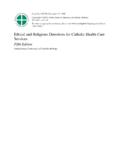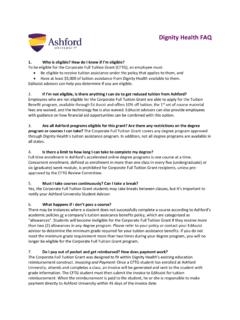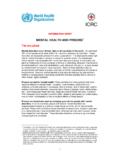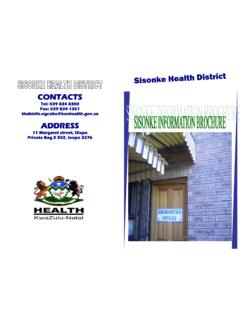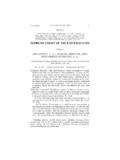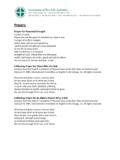Transcription of SAMPLE REPORT - WHO | World Health Organization
1 RESPONSIVENESS. Key Informant Opinion Survey Health system responsiveness survey results: equitable, humane, patient-centred treatment by Health systems, or not? SAMPLE REPORT . Country Profile November 2003. 1. World Health Organization Responsiveness Results Health system responsiveness survey results: equitable, humane, patient- centred treatment by Health systems, or not? Background As part of an on-going programme to assess the responsiveness of Health systems to the population, WHO undertook a Key Informants Survey of Health and Responsiveness in 2001.
2 The main purpose of the survey was to find out what key players thought of their Health system in terms of it having a culture of respecting users and being people-oriented ( responsiveness). The key informants included Health professionals, members of civil society groups and academics, amongst others. This short REPORT , prepared for 41 countries (see Annex 1), presents the major findings from the survey of key informants' opinions on Health system responsiveness in their country. Further detailed results for each country are available on request.
3 Questionnaire Key informants were interviewed using a structured questionnaire. The key informant questionnaire is one instrument from a questionnaire portfolio developed by WHO for measuring Health system responsiveness. The 2001 key informant instrument was refined following feedback from the 1999 key informant survey carried out in 35 countries, and was tested prior to being fielded on 30-40. respondents inside WHO and collaborating centers. It consisted of 12 sections and took approximately hours to administer. Implementation Most of the KIS surveys were administered through WHO country representatives (WRs) and liaison officers, accounting for roughly 87% of total responses.
4 In several cases, WRs personally conducted face-to-face interviews. Other responses obtained were from individuals who responded to the questionnaire posted on the WHO. Internet. The web posting was publicised through electronic mailing lists and site links. As the purpose of the survey was to obtain the views of diverse people formally involved in the Health system, the people running the surveys in the countries (focal points) were instructed to select key informants from many different affiliations, including Ministries of Health , public and private Health services, expert advisory panels, universities, and non-governmental organizations.
5 The results presented below summarize the main views of key informants on their Health system's responsiveness. While the recommended gold standard for measuring responsiveness remains the patient or household interview, key informant surveys can also provide useful information regarding the opinions of Health providers and other key players. The selection and knowledge of the key informants is key to interpreting the results well. Key informants in these surveys were selected by WHO representatives working in the countries. This approach had a built-in quality check in the sense that WHO representatives, by virtue of their work, are familiar with the different players in the Health system.
6 Given their close association with ministries of Health , it is inevitable that WHO representatives interviewed a large number of government civil servants. This being said, following the instructions to canvas as wide an audience as possible, WRs made a special effort also to reach the private sector, academics and other players in the Health system. Given that the background of the key informants is important for understanding the results, this information is presented as one of the key results of the survey alongside the main results on responsiveness.
7 2. World Health Organization Responsiveness Results Responsiveness themes Responsiveness has built on components of patient satisfaction, quality of care and patient experience literature by providing a structured framework for discussing and measuring patient issues thereby complimenting the enormous range of bio-medical metrics for measuring Health outcomes. Questions used in the key informant survey questionnaire built on the themes outlined in Table 1. Generically, the responsiveness questionnaire are tools for monitoring how Health systems treat people in its aims to promote Health as a state of complete physical, mental and social well-being and not merely the absence of disease or infirmity (WHO's 1948.)
8 Constitution). The areas, or domains, of responsiveness can be grouped according to service aspects related to human dignity (respect for persons), and domains related to the system having a client orientated approach (see Table 1). Table 1: Main themes of the responsiveness domains used as a basis for developing questions in the key informant questionnaire Domain Short Themes for survey questions Label Description nomy Auto- Involvement in consulting patients about preferred treatments decisions obtaining patient consent Respect for persons domains patients are given information on alternative treatment options Communica- Clarity of Health care providers explain diagnoses and treatments clearly Communication patients encouraged to ask questions tion Health systems provide
9 Information about how to avoid getting ill Health insurance systems provider clear information about payments and benefits Confiden Confidentiality of . -tiality consultations carried out so they protect patient confidentiality personal confidentiality of patient information and formal records is information ensured patients are treated with respect by Health system staff dignity Respectful in particular, the dignity of patients with diseases with stigma's treatment AIDS or leprosy is safeguarded patient privacy during physical examinations is respected Choice Choice of Health patients are given a choice of Health care providers care provider patients are given a choice of Health care facilities the quality of basic Health service infrastructure is adequate, Client orientation domains amenities Quality Surroundings space, seating and fresh air basic basic facilities at Health clinics are clean ( rooms, toilets).
10 Reasonable waiting time for tests and results attention Prompt Convenient reasonable length waiting lists for non-emergency surgery travel and short reasonable waiting times at Health services for a consultation waiting times convenient travel and reasonable travel times to Health facilities Access to family (social) support and community Contact with patients may be accompanied by friends or relatives during outside World consultations and patients have the opportunity to have personal needs taken maintenance of care of by friends and family while receiving care regular activities 3.










